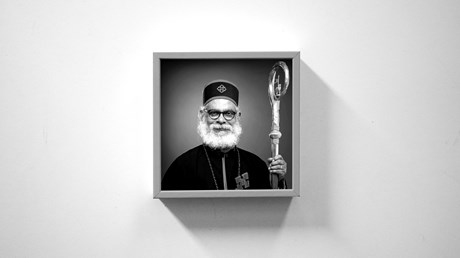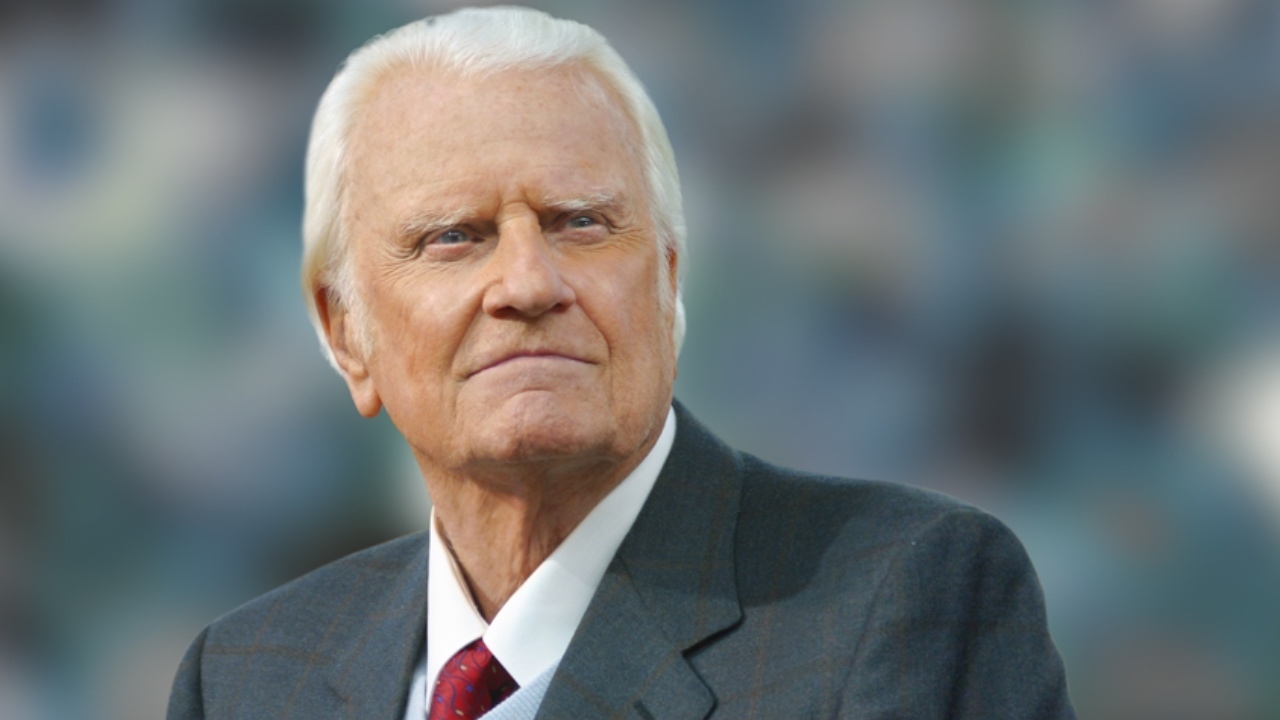Searched: 200
News
What has changed since May 2002? What remains the same?
|
A historic German church in Heidelberg held worship services on Sunday featuring the music of pop artist Taylor Swift.
|
 The centuries-old Church of the Holy Spirit in Heidelberg, Germany, drew more than 1,200 people on Sunday for worship services featuring the music of Taylor Swift. The centuries-old Church of the Holy Spirit in Heidelberg, Germany, drew more than 1,200 people on Sunday for worship services featuring the music of Taylor Swift. |
Māori Christians in New Zealand bristle at newly translated portions of the Bible that use the names of local deities.
 Last year, Bible Society New Zealand (BSNZ) released a 109-page booklet with 10 Bible passages published in a contemporary Māori translation for the first time. The version used the names of atua Māori, or Māori gods and deities, in place of words like heaven, earth, land, and sea. Genesis 1:1, for example, says that in the beginning, God made Rangi-nui (Sky Father) and Papatūānuku (Earth Mother) instead of rangi and whenua respectively.The changes, meant to appeal to younger Māori, stirred debate. While some readers praised the changes (“The terms are more relatable,” wrote one respondent in a BSNZ survey), many, including Māori theologians and church leaders, decried the use of atua Māori in the Scriptures as “twisted” and “blasphemous.”The aim of publishing He Tīmatanga (A Beginning) was not to present a final translation but to offer a draft for feedback, said Clare Knowles, translation coordinator at BSNZ. Publishing these passages was part of an effort that began in 2008 to “retranslate the entire Bible into Māori [in] today’s language.”While Māori speakers in New Zealand have a Bible translation in their language, it was last revised in 1952. The most recent edition in 2012 mainly focused on reformatting the text with updated paragraphs, spelling, and punctuation, but the content has largely remained the same since missionaries first translated the Bible into Māori in the 19th century.“Imagine if the only English translation we had was the King James Version. … This is a bit like the situation with Te Paipera Tapu, the Māori Bible,” Knowles wrote in an article promoting He Tīmatanga.In New Zealand, about 8 percent of the population speak Māori, ...Continue reading... Last year, Bible Society New Zealand (BSNZ) released a 109-page booklet with 10 Bible passages published in a contemporary Māori translation for the first time. The version used the names of atua Māori, or Māori gods and deities, in place of words like heaven, earth, land, and sea. Genesis 1:1, for example, says that in the beginning, God made Rangi-nui (Sky Father) and Papatūānuku (Earth Mother) instead of rangi and whenua respectively.The changes, meant to appeal to younger Māori, stirred debate. While some readers praised the changes (“The terms are more relatable,” wrote one respondent in a BSNZ survey), many, including Māori theologians and church leaders, decried the use of atua Māori in the Scriptures as “twisted” and “blasphemous.”The aim of publishing He Tīmatanga (A Beginning) was not to present a final translation but to offer a draft for feedback, said Clare Knowles, translation coordinator at BSNZ. Publishing these passages was part of an effort that began in 2008 to “retranslate the entire Bible into Māori [in] today’s language.”While Māori speakers in New Zealand have a Bible translation in their language, it was last revised in 1952. The most recent edition in 2012 mainly focused on reformatting the text with updated paragraphs, spelling, and punctuation, but the content has largely remained the same since missionaries first translated the Bible into Māori in the 19th century.“Imagine if the only English translation we had was the King James Version. … This is a bit like the situation with Te Paipera Tapu, the Māori Bible,” Knowles wrote in an article promoting He Tīmatanga.In New Zealand, about 8 percent of the population speak Māori, ...Continue reading... |
The champion of “native missions” trained more than 100,000 evangelists but got in trouble for financial mismanagement.
 Athanasius Yohannan, who built one of the world’s largest mission organizations on the idea that Western Christians should support “native missionaries” but got in trouble for financial irregularities and dishonest fundraising, died on May 8. He was 74 and got hit by a car while walking along the road near his ministry headquarters in Texas.Born Kadapilaril Punnoose Yohannan and known for most of his ministry as K. P., Yohannan founded Gospel for Asia in 1979. Over the next 45 years, the organization trained more than 100,000 people to preach the gospel and plant and pastor churches in India, Bangladesh, Nepal, Sri Lanka, and other places in Southeast Asia, according to a recent ministry report. Gospel for Asia raised as much as $93 million in a year and in 2005 reported it was supporting about 14,500 indigenous evangelists and pastors in same-culture and near-culture ministry. Christians in the US were asked to give $30 per month to support them.“If we evangelize the world’s lost billions … it will be through native missions,” Yohannan wrote for CT. “The native missionary is far more effective than the expatriate. The national already knows the language and is already part of the culture. In many instances, he or she can go places where outsiders cannot go.”Yohannan’s death was mourned by Gospel for Asia, the church that he started and served as metropolitan bishop, and prominent political leaders in India.“He will be remembered for his service to society and emphasis on improving the quality of life of the downtrodden,” Prime Minister Narendra Modi wrote on social media. “May his soul rest in peace.”Both the governor of Kerala and the ...Continue reading... Athanasius Yohannan, who built one of the world’s largest mission organizations on the idea that Western Christians should support “native missionaries” but got in trouble for financial irregularities and dishonest fundraising, died on May 8. He was 74 and got hit by a car while walking along the road near his ministry headquarters in Texas.Born Kadapilaril Punnoose Yohannan and known for most of his ministry as K. P., Yohannan founded Gospel for Asia in 1979. Over the next 45 years, the organization trained more than 100,000 people to preach the gospel and plant and pastor churches in India, Bangladesh, Nepal, Sri Lanka, and other places in Southeast Asia, according to a recent ministry report. Gospel for Asia raised as much as $93 million in a year and in 2005 reported it was supporting about 14,500 indigenous evangelists and pastors in same-culture and near-culture ministry. Christians in the US were asked to give $30 per month to support them.“If we evangelize the world’s lost billions … it will be through native missions,” Yohannan wrote for CT. “The native missionary is far more effective than the expatriate. The national already knows the language and is already part of the culture. In many instances, he or she can go places where outsiders cannot go.”Yohannan’s death was mourned by Gospel for Asia, the church that he started and served as metropolitan bishop, and prominent political leaders in India.“He will be remembered for his service to society and emphasis on improving the quality of life of the downtrodden,” Prime Minister Narendra Modi wrote on social media. “May his soul rest in peace.”Both the governor of Kerala and the ...Continue reading... |
From 1978 to 2008, he fought for legal recognition and freedom to worship for the Anabaptist denomination.
 Nguyen Quang Trung spent 30 years trying to get the Mennonite church recognized and registered by the government of Vietnam so that believers could meet and worship legally. When he finally succeeded, he celebrated the triumph with the words of the apostle Paul: “If we live, we live for the Lord; and if we die, we die for the Lord. So, whether we live or die, we belong to the Lord” (Rom. 14:8).Nguyen, a pastor and two-time president of Hội Thánh Mennonite Việt Nam (Vietnam Mennonite Church), died on March 23 at age 84. He was known for his “patient persistence” and “tireless efforts to promote and legally confirm a Mennonite presence in Vietnam,” Gerry Keener, former head of Eastern Mennonite Missions, told Anabaptist World.Nguyen was born in Gia Dinh, an industrial area outside Saigon. His mother died when he was five. His father was a committed Christian who raised him in the Evangelical Church of Vietnam, part of the Christian and Missionary Alliance.In his 20s, Nguyen found himself drawn to the Mennonites, spending a lot of time in a reading room established by the Eastern Mennonite Board of Missions and Charities. He took classes on English and the Bible and learned the Anabaptist teachings about nonviolence.“The same Spirit that empowered Jesus also empowers us to love enemies,” the missionaries taught Nguyen, “to forgive rather than to seek revenge, to practice right relationships, to rely on the community of faith to settle disputes, and to resist evil without violence.”Nguyen embraced the idea that Christians should “follow Christ in the way of peace” and practice “nonresistance,” even if they faced persecution and death.The ...Continue reading... Nguyen Quang Trung spent 30 years trying to get the Mennonite church recognized and registered by the government of Vietnam so that believers could meet and worship legally. When he finally succeeded, he celebrated the triumph with the words of the apostle Paul: “If we live, we live for the Lord; and if we die, we die for the Lord. So, whether we live or die, we belong to the Lord” (Rom. 14:8).Nguyen, a pastor and two-time president of Hội Thánh Mennonite Việt Nam (Vietnam Mennonite Church), died on March 23 at age 84. He was known for his “patient persistence” and “tireless efforts to promote and legally confirm a Mennonite presence in Vietnam,” Gerry Keener, former head of Eastern Mennonite Missions, told Anabaptist World.Nguyen was born in Gia Dinh, an industrial area outside Saigon. His mother died when he was five. His father was a committed Christian who raised him in the Evangelical Church of Vietnam, part of the Christian and Missionary Alliance.In his 20s, Nguyen found himself drawn to the Mennonites, spending a lot of time in a reading room established by the Eastern Mennonite Board of Missions and Charities. He took classes on English and the Bible and learned the Anabaptist teachings about nonviolence.“The same Spirit that empowered Jesus also empowers us to love enemies,” the missionaries taught Nguyen, “to forgive rather than to seek revenge, to practice right relationships, to rely on the community of faith to settle disputes, and to resist evil without violence.”Nguyen embraced the idea that Christians should “follow Christ in the way of peace” and practice “nonresistance,” even if they faced persecution and death.The ...Continue reading... |
From 1978 to 2008, he fought for legal recognition and freedom to worship for the Anabaptist denomination.
 Nguyen Quang Trung spent 30 years trying to get the Mennonite church recognized and registered by the government of Vietnam so that believers could meet and worship legally. When he finally succeeded, he celebrated the triumph with the words of the apostle Paul: “If we live, we live for the Lord; and if we die, we die for the Lord. So, whether we live or die, we belong to the Lord” (Rom. 14:8).Nguyen, a pastor and two-time president of Hội Thánh Mennonite Việt Nam (Vietnam Mennonite Church), died on March 23 at age 84. He was known for his “patient persistence” and “tireless efforts to promote and legally confirm a Mennonite presence in Vietnam,” Gerry Keener, former head of Eastern Mennonite Missions, told Anabaptist World.Nguyen was born in Gia Dinh, an industrial area outside Saigon. His mother died when he was five. His father was a committed Christian who raised him in the Evangelical Church of Vietnam, part of the Christian and Missionary Alliance.In his 20s, Nguyen found himself drawn to the Mennonites, spending a lot of time in a reading room established by the Eastern Mennonite Board of Missions and Charities. He took classes on English and the Bible and learned the Anabaptist teachings about nonviolence.“The same Spirit that empowered Jesus also empowers us to love enemies,” the missionaries taught Nguyen, “to forgive rather than to seek revenge, to practice right relationships, to rely on the community of faith to settle disputes, and to resist evil without violence.”Nguyen embraced the idea that Christians should “follow Christ in the way of peace” and practice “nonresistance,” even if they faced persecution and death.The ...Continue reading... Nguyen Quang Trung spent 30 years trying to get the Mennonite church recognized and registered by the government of Vietnam so that believers could meet and worship legally. When he finally succeeded, he celebrated the triumph with the words of the apostle Paul: “If we live, we live for the Lord; and if we die, we die for the Lord. So, whether we live or die, we belong to the Lord” (Rom. 14:8).Nguyen, a pastor and two-time president of Hội Thánh Mennonite Việt Nam (Vietnam Mennonite Church), died on March 23 at age 84. He was known for his “patient persistence” and “tireless efforts to promote and legally confirm a Mennonite presence in Vietnam,” Gerry Keener, former head of Eastern Mennonite Missions, told Anabaptist World.Nguyen was born in Gia Dinh, an industrial area outside Saigon. His mother died when he was five. His father was a committed Christian who raised him in the Evangelical Church of Vietnam, part of the Christian and Missionary Alliance.In his 20s, Nguyen found himself drawn to the Mennonites, spending a lot of time in a reading room established by the Eastern Mennonite Board of Missions and Charities. He took classes on English and the Bible and learned the Anabaptist teachings about nonviolence.“The same Spirit that empowered Jesus also empowers us to love enemies,” the missionaries taught Nguyen, “to forgive rather than to seek revenge, to practice right relationships, to rely on the community of faith to settle disputes, and to resist evil without violence.”Nguyen embraced the idea that Christians should “follow Christ in the way of peace” and practice “nonresistance,” even if they faced persecution and death.The ...Continue reading... |
These CEH articles from May 2002, lost in a website upgrade, are posted again here for amazement or amusement.
|
These CEH articles from May 2002, lost in a website upgrade, are posted again here for amazement or amusement.
|
The champion of “native missions” trained more than 100,000 evangelists but got in trouble for financial mismanagement.
 Athanasius Yohannan, who built one of the world’s largest mission organizations on the idea that Western Christians should support “native missionaries” but got in trouble for financial irregularities and dishonest fundraising, died on May 8. He was 74 and got hit by a car while walking along the road near his ministry headquarters in Texas.Born Kadapilaril Punnoose Yohannan and known for most of his ministry as K. P., Yohannan founded Gospel for Asia in 1979. Over the next 45 years, the organization trained more than 100,000 people to preach the gospel and plant and pastor churches in India, Bangladesh, Nepal, Sri Lanka, and other places in Southeast Asia, according to a recent ministry report. Gospel for Asia raised as much as $93 million in a year and in 2005 reported it was supporting about 14,500 indigenous evangelists and pastors in same-culture and near-culture ministry. Christians in the US were asked to give $30 per month to support them.“If we evangelize the world’s lost billions … it will be through native missions,” Yohannan wrote for CT. “The native missionary is far more effective than the expatriate. The national already knows the language and is already part of the culture. In many instances, he or she can go places where outsiders cannot go.”Yohannan’s death was mourned by Gospel for Asia, the church that he started and served as metropolitan bishop, and prominent political leaders in India.“He will be remembered for his service to society and emphasis on improving the quality of life of the downtrodden,” Prime Minister Narendra Modi wrote on social media. “May his soul rest in peace.”Both the governor of Kerala and the ...Continue reading... Athanasius Yohannan, who built one of the world’s largest mission organizations on the idea that Western Christians should support “native missionaries” but got in trouble for financial irregularities and dishonest fundraising, died on May 8. He was 74 and got hit by a car while walking along the road near his ministry headquarters in Texas.Born Kadapilaril Punnoose Yohannan and known for most of his ministry as K. P., Yohannan founded Gospel for Asia in 1979. Over the next 45 years, the organization trained more than 100,000 people to preach the gospel and plant and pastor churches in India, Bangladesh, Nepal, Sri Lanka, and other places in Southeast Asia, according to a recent ministry report. Gospel for Asia raised as much as $93 million in a year and in 2005 reported it was supporting about 14,500 indigenous evangelists and pastors in same-culture and near-culture ministry. Christians in the US were asked to give $30 per month to support them.“If we evangelize the world’s lost billions … it will be through native missions,” Yohannan wrote for CT. “The native missionary is far more effective than the expatriate. The national already knows the language and is already part of the culture. In many instances, he or she can go places where outsiders cannot go.”Yohannan’s death was mourned by Gospel for Asia, the church that he started and served as metropolitan bishop, and prominent political leaders in India.“He will be remembered for his service to society and emphasis on improving the quality of life of the downtrodden,” Prime Minister Narendra Modi wrote on social media. “May his soul rest in peace.”Both the governor of Kerala and the ...Continue reading... |
The champion of “native missions” trained more than 100,000 evangelists but got in trouble for financial mismanagement.
 Athanasius Yohannan, who built one of the world’s largest mission organizations on the idea that Western Christians should support “native missionaries” but got in trouble for financial irregularities and dishonest fundraising, died on May 8. He was 74 and got hit by a car while walking along the road near his ministry headquarters in Texas.Born Kadapilaril Punnoose Yohannan and known for most of his ministry as K. P., Yohannan founded Gospel for Asia in 1979. Over the next 45 years, the organization trained more than 100,000 people to preach the gospel and plant and pastor churches in India, Bangladesh, Nepal, Sri Lanka, and other places in Southeast Asia, according to a recent ministry report. Gospel for Asia raised as much as $93 million in a year and in 2005 reported it was supporting about 14,500 indigenous evangelists and pastors in same-culture and near-culture ministry. Christians in the US were asked to give $30 per month to support them.“If we evangelize the world’s lost billions … it will be through native missions,” Yohannan wrote for CT. “The native missionary is far more effective than the expatriate. The national already knows the language and is already part of the culture. In many instances, he or she can go places where outsiders cannot go.”Yohannan’s death was mourned by Gospel for Asia, the church that he started and served as metropolitan bishop, and prominent political leaders in India.“He will be remembered for his service to society and emphasis on improving the quality of life of the downtrodden,” Prime Minister Narendra Modi wrote on social media. “May his soul rest in peace.”Both the governor of Kerala and the ...Continue reading... Athanasius Yohannan, who built one of the world’s largest mission organizations on the idea that Western Christians should support “native missionaries” but got in trouble for financial irregularities and dishonest fundraising, died on May 8. He was 74 and got hit by a car while walking along the road near his ministry headquarters in Texas.Born Kadapilaril Punnoose Yohannan and known for most of his ministry as K. P., Yohannan founded Gospel for Asia in 1979. Over the next 45 years, the organization trained more than 100,000 people to preach the gospel and plant and pastor churches in India, Bangladesh, Nepal, Sri Lanka, and other places in Southeast Asia, according to a recent ministry report. Gospel for Asia raised as much as $93 million in a year and in 2005 reported it was supporting about 14,500 indigenous evangelists and pastors in same-culture and near-culture ministry. Christians in the US were asked to give $30 per month to support them.“If we evangelize the world’s lost billions … it will be through native missions,” Yohannan wrote for CT. “The native missionary is far more effective than the expatriate. The national already knows the language and is already part of the culture. In many instances, he or she can go places where outsiders cannot go.”Yohannan’s death was mourned by Gospel for Asia, the church that he started and served as metropolitan bishop, and prominent political leaders in India.“He will be remembered for his service to society and emphasis on improving the quality of life of the downtrodden,” Prime Minister Narendra Modi wrote on social media. “May his soul rest in peace.”Both the governor of Kerala and the ...Continue reading... |
 The late evangelist Billy Graham will take his place next week among 200 Americans honored with a statue in the U.S. Capitol in Washington, D.C.? The late evangelist Billy Graham will take his place next week among 200 Americans honored with a statue in the U.S. Capitol in Washington, D.C.? |
Migrant rights have been off-radar for many Panamanian Christians. But as pressures increase, some are speaking out ahead of this weekend's general elections.
 Update (May 6, 2024): José Raúl Mulino will be Panama’s new president after the Realizando Metas (Realizing Goals) party candidate won 34.2 percent of the vote.Mulino began the campaign as the running mate of former president Ricardo Martinelli. (Martinelli previously served from 2009 to 2014.) When Martinelli was booted from the ticket after receiving a 10-year prison sentence for money laundering, Mulino assumed the top of the ticket. While other candidates fought to get him removed from the ballot for bypassing the party’s selection process, the country’s supreme court declared it legal two days prior to the election.Last month, Mulino promised to close the Darién Gap, where tens of thousands of migrants have crossed from Colombia to Panama on their journey to the US border. On Monday, the president-elect reiterated his desire to do so, saying that he will work with the governments of Colombia and the United States to jointly create a long-term solution.“Currently we have technology to survey the border, and I hope to start a repatriation process as early as possible,” he said in an interview Monday with Radio Blu.Mulino is set to be inaugurated on July 1.----On May 5, Panamanians will vote for a new president. The outcome of this election may have consequences for far more than its 4.4 million residents; it could change the migration reality for the hundreds of thousands of people traveling from South America, Asia, and Africa who pass through the Central American country en route to the United States.Leading in the polls is José Raúl Mulino, a candidate for Realizando Metas (Realizing Goals), a right-wing populist party founded by disgraced president Ricardo ...Continue reading... Update (May 6, 2024): José Raúl Mulino will be Panama’s new president after the Realizando Metas (Realizing Goals) party candidate won 34.2 percent of the vote.Mulino began the campaign as the running mate of former president Ricardo Martinelli. (Martinelli previously served from 2009 to 2014.) When Martinelli was booted from the ticket after receiving a 10-year prison sentence for money laundering, Mulino assumed the top of the ticket. While other candidates fought to get him removed from the ballot for bypassing the party’s selection process, the country’s supreme court declared it legal two days prior to the election.Last month, Mulino promised to close the Darién Gap, where tens of thousands of migrants have crossed from Colombia to Panama on their journey to the US border. On Monday, the president-elect reiterated his desire to do so, saying that he will work with the governments of Colombia and the United States to jointly create a long-term solution.“Currently we have technology to survey the border, and I hope to start a repatriation process as early as possible,” he said in an interview Monday with Radio Blu.Mulino is set to be inaugurated on July 1.----On May 5, Panamanians will vote for a new president. The outcome of this election may have consequences for far more than its 4.4 million residents; it could change the migration reality for the hundreds of thousands of people traveling from South America, Asia, and Africa who pass through the Central American country en route to the United States.Leading in the polls is José Raúl Mulino, a candidate for Realizando Metas (Realizing Goals), a right-wing populist party founded by disgraced president Ricardo ...Continue reading... |
These entries from May 2002, lost during a website upgrade, are reposted here for edification, amusement, or both.
|
These entries from May 2002, lost during a website upgrade, are reposted here for edification, amusement, or both.
|
By David Bell and Thi Thuy Van Dinh For two years, the 196 State Parties to the 2005 International Health Regulations (IHR) – composed of...The New IHR Changes Are Merely Cosmetic
|
Articles we printed in April 2002 lead to a question: have evolutionists changed in the last 22 years?
|
Articles we printed in April 2002 lead to a question: have evolutionists changed in the last 22 years?
|
By Kimberlee Josephson Corporate Social Responsibility (CSR) has been widely embraced within academic business programming since the early 2000s. The trendy appeal of Bono's Buy...Business Schools Undermine Wealth Creation
|
Over 200 legends of an ancient global flood have been discovered around the world. What is the best explanation for the existence of these flood legends?
|
More than 200 people were baptized along a scenic Florida beach on Easter Sunday as part of a worship service hosted by a revivalist who once dabbled in the occult before she was freed by Christ.
|
When Vision Baptist Church was officially started in March of 2006 we had all the dreams and desires of most church plants. We prayed that God would use our combined efforts to see people come to know Christ and become followers of Him. It was also our desire that God would use our new church […]The post Discipleship builds a church. appeared first on Vision Baptist Church of South Forsyth.
|
On Holy Saturday 2007, cartoonist Johnny Hart died of a stroke while working at his drawing table. Hart was the award-winning creator of the popular comic strips “The Wizard of Id” and “B.C.” which, at one time, reached 100 million readers worldwide every day. In a 1999 BreakPoint? commentary, Chuck Colson identified Hart as “the most widely read Christian of our time,” with “more readers than C.S. Lewis, Frank Peretti, and Billy Graham combined.”
|
What do you picture when you think of church?Do you think of the rows of wooden pews or the intricate stained-glass windows in the sanctuary? Stacks of Bibles and hymnals? What about a stage or pulpit? Maybe you think of a large auditorium setting if you attend a mega church.? All these details tell us what we see when we look at a building, but they tell us nothing about what a church should biblically look like. Scripture does not give directions about the format of seating or the use of a stage. We find no mention of a required carpet color or use of stained-glass windows. During the early days of the church, there were no chapels or cathedrals with steeples. That is because the Church is not a building.? Believers make up the body of Christ, the Church (1 Corinthians 12:27).? As members of the body of Christ, what we look like stems from our relationship to Jesus and the mission He gave us. He has called us to be a multiplying people, a community that grows and reaches into the lives of others. It is a group of individuals who increasingly look like Him.? C.S. Lewis wrote about the purpose of the church in Mere Christianity. As he explained, “[T]he church exists for nothing else but to draw men into Christ, to make them little Christs. If they are not doing that, all the cathedrals, clergy, missions, sermons, even the Bible itself, are simply a waste of time” (HarperOne, 2001, p. 199).At first, Lewis' statement might surprise us. Constructing buildings, doing missions, and studying the Bible are wastes of time? They are if people are not growing in Christ and making disciples. The body of believers is meant to look increasingly like Jesus and help others become reflections of Christ too. If the church is not doing that, then it is not accomplishing its purpose. It will not look like a biblical church. ? ? But what are the indications that a group of believers are accomplishing this purpose of growing to become more like Christ? ? ? ? Scripture does not have directions about what a church building should look like, but it does have a wealth of information about what it looks like to live as individuals belonging to the Church.Photo credit: ©Getty Images/Will & Deni McIntyre
|



 Links
Links  Articles
Articles  Blogs
Blogs  Videos
Videos  News
News  Colors
Colors 

 New links
New links

